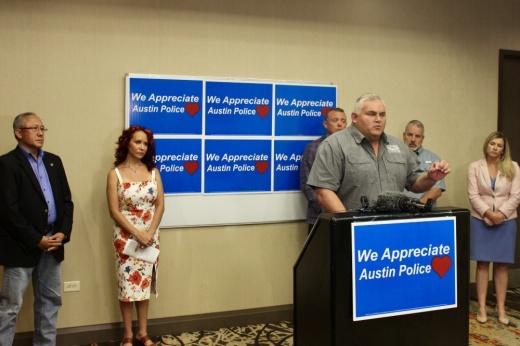The Save Austin Now political action committee, which also drove the passage of the homelessness-focused Proposition B this spring, in May launched another public safety petition drive with the goal of gathering tens of thousands of signatures over the course of several weeks. SAN leaders and law enforcement advocates gathered downtown July 19 to announce the success of that effort, dubbed "Make Austin Safe."
According to SAN co-founder Matt Mackowiak, more than 25,600 Austin voters signed onto the petition after it was announced May 26. State law requires petitions to receive support of the fewer of 5% of a city's population or 20,000 voters to make it onto a ballot.
“Today, we are sending a very clear message that this city supports law enforcement even if City Hall does not. We are going to put this in front of the voters and let the voters decide," Mackowiak said. "We believe that ... Austin can become a model for the nation.”
The petition covers several provisions, including a central shift in the police department that would tie staffing to Austin's population at a level of two officers per 1,000 residents. Mackowiak and SAN supporters this year have repeatedly pointed to a staffing shortfall they say is making the city less safe; as of mid-July Mackowiak said Austin is nearly 400 officers short of "where we should be” for a city of its size.
Austin Police Association President Ken Casaday said earlier this month that the majority of police patrol shifts are not fully staffed with more than one-third routinely falling below "minimum staffing levels." Casaday also noted that with Austin police's current rate of 15 to 20 officer retirements or resignations per month, attrition at the department will likely outpace any staffing gains made through ongoing and proposed cadet classes.
"The math just doesn’t add up for our department and for public safety and the citizens of Austin," Casaday said July 12.
Based on Austin's U.S. Census Bureau Vintage 2020 population estimate of 995,484—tied to projections from previous years' data, not last year's census results—Austin's budgeted 1,809 full-time sworn officers would represent a ratio of 1.82 officers per 1,000 city residents if the department was fully staffed. Casaday said last week that the department sits around 1,650 sworn officers, good for 1.66 per 1,000 residents based on last year's population.
Following SAN's July 19 announcement, more than two dozen local organizations signaled their opposition to the proposal and its headline officer staffing boost. In a statement, representatives from several of those groups expressed concern that the set officer ratio could result in funding cuts for public health, homelessness solutions, neighborhood improvements and recreational amenities.
“This petition sets a mandatory police officer staffing requirement that will require, initially, at least 500 new officers at a cost of roughly $50 million,” said Kathy Mitchell, policy coordinator for the criminal justice reform nonprofit Just Liberty. “More and more police officers will have to be hired every year no matter what is happening with crime, while we would have to underfund other public safety priorities like EMS. That’s absurd.”
Other critics of the proposition said the measure could halt some of the momentum of the city's yearlong push to "reimagine" public safety, which remains in progress and incorporated in Austin's proposed fiscal year 2021-22 budget.
“We need a comprehensive public safety approach that centers community well-being and addresses the root causes of community harm,” said Cate Graziani, co-executive director of the Texas Harm Reduction Alliance. “Austin took a step in the right direction when they invested in more paramedics, mental health clinicians and harm reduction outreach teams. This right-wing petition basically says Austin is only going to hire police officers forever—at the expense of EMS, mental health, street outreach and social services—and sabotages our work to reimagine public safety.”
Proposition points
Additional pieces of the SAN ballot proposition affecting police operations would require three full-time cadet classes to be in session until the department is staffed with 1,959 full-time sworn officers; double annual in-service training from 40 to 80 hours; and provide new incentives for officers who are multilingual, engaged in a mentoring program or eligible for honorable conduct citations.
The petition plan would also see officers hired based upon the demographic makeup of Austin. Finally, the measure would require the mayor, City Council members, council members' staff, the director of the Office of Police Oversight, and members of the Public Safety and Community Police Review commissions to complete both the Citizen Police Academy training and a police ride-along program.
Like Proposition B earlier this year, the Make Austin Safe proposition language does not include details on how its provisions would be funded if voters approve the ordinance. Mackowiak said July 19 that the city's proposed budget, which includes a $442.81 million allocation for the police department, would be sufficient to cover the costs of additional staffing and training.
"People want to ask, ‘How much does this cost? Where do you find the money?’ The money was there two years ago. The money is now there because of House Bill 1900. So it’s not simply a question of money; it’s a question of priorities," Mackowiak said.
SAN's thousands of voter-signed petitions will now be reviewed by the city clerk's office over the coming days to ensure all signatures are valid. Mackowiak said SAN internally validated the majority of the pool and believes the measure will make it to the Nov. 2 ballot.





